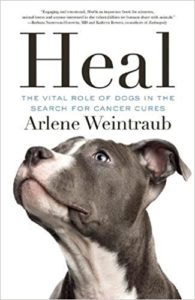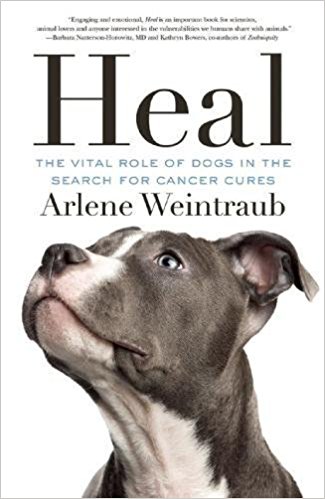By Arlene Weintraub
When the veterinarian says, “Your dog has cancer, and the prognosis is grim.” Find out if a clinical study is occurring for your pet’s type of cancer. Many of the dogs described in Heal had miracles of surviving long past the expected prognosis while testing experimental drugs.
 Would I recommend this book? Yes, it was very informative, although a bit technical. Weintraub wound together the story of her sister’s battle with gastric cancer, with research on various types of cancers in dogs, which ultimately aided humans.
Would I recommend this book? Yes, it was very informative, although a bit technical. Weintraub wound together the story of her sister’s battle with gastric cancer, with research on various types of cancers in dogs, which ultimately aided humans.
Mice are often used in oncology research studies, but mice do not develop most cancers naturally and so cancer has to be introduced—and then cured. Often drugs and therapies that work in mice do not work well in people.
Dogs develop many different types of cancers naturally and through the study of comparative oncology, help find cancer cures for humans. Dogs are about 85% genetically similar to people, making cures for dogs very likely to have similar results in people. Cancer cells occur all the time in our bodies, but usually our immune system wards off the cells before they become problematic.
Comparative oncology studies use companion animals for research. The studies give these pets the benefit of testing new, potentially life-saving treatments. The priority of the studies is not just the use of the drug, but the dog’s comfort—this distinguishes comparative oncology from many other types of research.
The past decade has shown many promising drugs that can target specific gene mutations and the creation of personalized medicine. Heal details many drugs and clinical studies for different types of cancers ranging from melanoma and osteosarcoma to lymphoma, and mammary tumors.
The final chapter of the book discusses how dogs can detect cancer in people, and development of a machine that was as accurate and efficient as a dog’s nose. At the time of writing Heal, dogs were still more efficient than the machine prototypes.
Conclusions
- Your vet may not have all the answers on the latest research. Search for clinical studies that may potentially help your pet with cancer.
- Support cancer research, especially for comparative oncology using dogs. Some of the critical studies nearly failed due to lack of funding.
Heal does not discuss new research on diets such as raw-food, or various supplements that claim to help fight cancer. Diet studies are a huge topic and changes in diet typically take longer to show an effect than the prognosis of most of the dogs discussed in Heal allowed.

